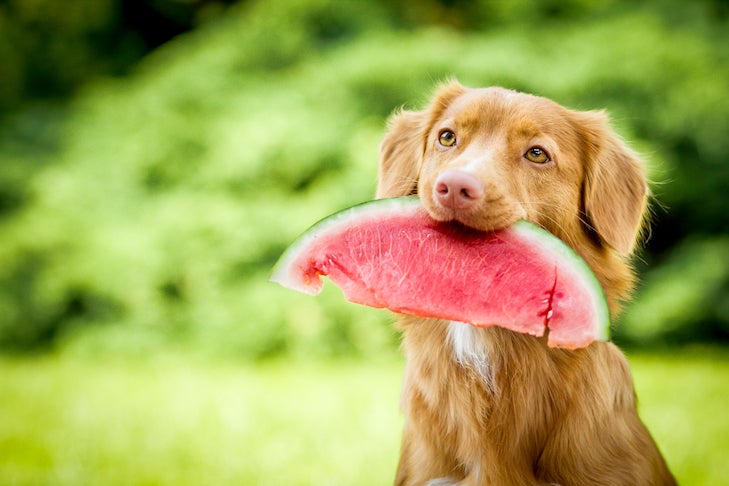AKC is a participant in affiliate advertising programs designed to provide a means for sites to earn advertising fees by advertising and linking to akc.org. If you purchase a product through this article, we may receive a portion of the sale.
Everybody loves watermelon, even dogs. But is it safe for them to eat?
The answer is yes, with a couple of precautions. First, seeds could cause an intestinal blockage, so make sure you remove them. It’s also a good idea to remove the rind because it can cause gastrointestinal upset.
What are the benefits of watermelon for dogs? The fruit itself is a health-food powerhouse, low in calories and packed with nutrients—vitamins A, B6, and C, and potassium. Plus, the fruit has only about 50 calories a cup and 92% water, so it’s great for hydration on a hot day. It also has no fat or cholesterol.
How to Feed a Dog Watermelon
Just like any treat, given to your dog in addition to their regular, balanced diet, watermelon should be fed in moderation.

Here are some safe ways to feed your dog watermelon:
- In chunks: Slice up a watermelon and remove the rinds and seeds.
- Frozen chunks: After removing the rinds and seeds, freeze the fruit in the freezer, then take it out on a hot summer day. The treat will help cool down your dog!
- Puree: Puree the fresh fruit after removing seeds and, then freeze in an ice cube tray or silicon mold.
- Watermelon “ice cream”: Blend frozen watermelon chunks with plain, unsweetened yogurt. Add on top of your dog’s food bowl or stuff into a rubber toy. Unless they suffer from lactose intolerance, plain yogurt is safe to eat for most dogs. It’s usually better tolerated than ice cream, and the bacterial cultures in yogurt are great for intestinal health. Just be sure to choose plain yogurt without any added flavors, fruit, sugars, natural sweeteners, or artificial sweeteners. Read the label carefully to be sure the product does not contain toxic xylitol. If your dog doesn’t handle yogurt well, consider other options like lactose-free, dairy-based yogurt, or dairy-free yogurt made from plant products. Always read the label to avoid any unsafe additives or ingredients.
Watermelon Facts
- An average 15-to-20-pound watermelon will yield 90 six-ounce wedges and 11 cups of cubes.
- Ever notice that some watermelons have internal cracks in the flesh? It’s a condition known as hollow heart and is caused by fluctuations in temperature during the growing season. Hollow heart melons are safe to eat. In fact, they are actually sweeter in spots because sugars tend to concentrate along the cracks.
- From planting to harvest, watermelons take three months to grow.
- Seedless melons were developed 50 years ago. They contain no black, mature seeds. But you may see white seed coats, where the seed did not mature.
- Citrullus lanatus is the scientific name for watermelon.
- Watermelons come from the botanical family Cucurbitaceae. They’re related to cucumbers, pumpkins, and squash.

